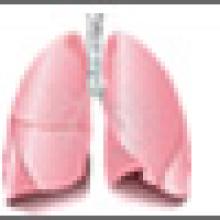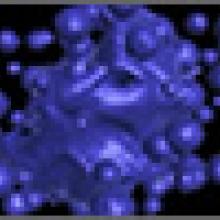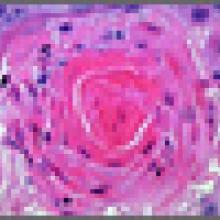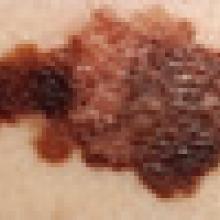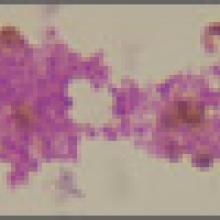Newsroom
Early detection of lung cancer is difficult. A new technology may change that. An international team of researchers has developed sensors that can detect differences in small chemicals released by normal vs lung cancer cells. The cells were grown in the laboratory and the air in… more
Patients taking particular chemotherapy drugs, including paclitaxel (Taxol®), are at risk for developing pain, numbness, burning, and/or tingling in their hands and feet. Also called chemotherapy-induced peripheral neuropathy (CIPN), the problem due to nerve damage caused by the drugs.
A… more
A study of almost 5000 women who were followed for about 12 years indicates that those women with higher levels of circulating glucose are at increased risk of developing colon cancer. The women whose levels were in the highest third had about twice the risk of developing colon cancer than… more
The surgery and radiation used to treat breast cancer can damage the lymphatic vessels in the area of treatment, leading to an increased risk for lymphedema, a swelling caused by fluid that leaks out of the lymphatic system into the tissues. The result is swelling, pain, and loss of function… more
For many years, it has been known that cancer cells have a huge appetite for sugar. They need lots of energy to reproduce but many cancer cells lack functioning pathways to get energy from other chemicals. The fact that cancer cells take in large amounts of glucose is even the basis for… more
Most genetic tests used to help physicians choose the best treatments for cancer patients examine a small number of genes. This may not be the case for long. The rapid advances in DNA sequencing technology have driven the cost down from millions of dollars to thousands of dollars per genome.… more
Cancer cells divide in an out of control manner. To constantly make new copies of themselves, they need lots of energy and raw materials. Scientists have shown that one way they get what the need is to digest their own components and recycle them. The process is known as autophagy… more
Two new studies have identified thiopurine drugs as risk factors for non-melanoma skin cancer. The drugs are used to treat inflammatory conditions, including Crohn's disease and inflammatory bowel syndrome (IBS). Thiopurines are also used to treat some forms of cancer. They work by… more
A new imaging device (MelaFind®) from Mela Sciences (www.melasciences.com) was recently approved by the FDA for the detection of melanoma skin cancer. The device scans the skin and compares the image to a library of images to determine whether melanoma is likely to be present. If the… more
Men who have sex with men are at risk for transmission of HPV. HPV is known to cause anal cancer. A study was performed to examine the effectiveness of an HPV vaccine (Gardasil®) in preventing the changes that lead up to anal cancer. Prior to the development of cancer, there are… more
About 90% of the deaths caused by cancer are due to cancer that has spread (metastasized) to distant locations in the body. New results show that the blood cell fragments called platelets may play an important role in the spread of cancer. Platelets were shown to secrete a protein (TGF-… more
When people think of vaccines, they usually imagine a shot that prevents a disease. In cancer, some vaccines are used to treat disease that has already developed. NIH researchers have shown that a vaccine can be used to stimulate immune responses to breast and ovarian cancer.
In the… more
One of the most frustrating side-effects of cancer treatment is the impairment of memory and though processing known informally as 'chemo brain'. New research with breast cancer patients has provided additional proof of the biological basis of the cognitive defects seen in cancer patients.… more
New 'targeted' cancer drugs typically work by blocking the activity of specific proteins in cancer cells. The targets are frequently enzymes, and the drugs are designed to fit into the 'active site' of the enzyme like a key in a lock. In this way, the drug prevents the enzyme from… more
Analysis of data from the PATRICIA (PApilloma TRIal against Cancer In young Adults) study has shown that Cervarix®, one of the two FDA approved cervical cancer vaccines is extremely effective. The results show that the vaccine is even able to prevent the progression of pre-cancerous… more
Results of a large study done see if vitamin E or selenium could prevent prostate cancer has actually shown the opposite result! The SELECT study was done to follow-up on a smaller study that indicated vitamin E might reduce prostate cancer risk. The SELECT study results indicate that… more
Colon cancer is one of the major causes of cancer death in the U.S. Although survival for all groups of patients has improved, African Americans (AA) still do not do as well as whites. An analysis of of clinical trials in which white and AA patients got the same treatment for their… more
A team of Duke researchers has developed a way that will let surgeons precisely identify brain cancer. It is esential that brain cancer be removed fully, but also that normal brain tissue be left unharmed. The research uses tiny gold rods that are attached to antibodies. The… more
Helicobacter pylori, a bacterium that that can live in the gut, is the single greatest risk for stomach (gastric) cancer. HOW the bacteria cause the disease is not clear. New research from Swiss and German researchers shows that infection of the gut lining leads to DNA damage in the gut… more
Researchers from Michigan and North Carolina have published a list of ten things patients can do to make sure that they make the most informed decisions about their cancer treatment choices. The list will also help clinicians to more clearly communicate the risks and benefits of different… more

